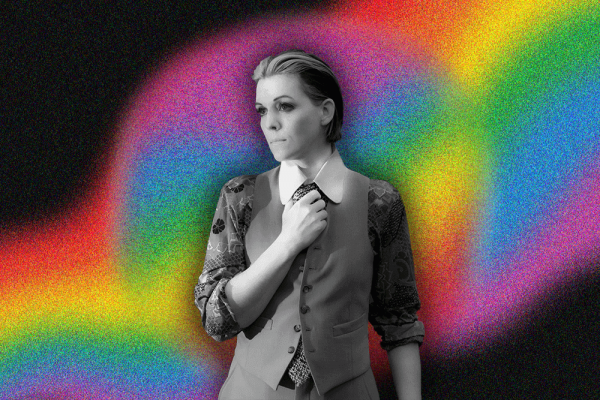I last saw Brandi Carlile perform during the Before Times. She was on tour for By The Way, I Forgive You, the album that would go on to take the top prize at the 2019 Grammys. As the set came to a close, she told the lighting technician to make it bright and suggested — firmly, lovingly — that we dance together as her band played “Hold Out Your Hand,” a sort of fight song for loving each other. By the time she arrived at the chorus, our shyness gave way to giddiness. It’s easy to clap and holler in the dark; it’s intimate to have that joy illuminated. When I talked with Carlile over Zoom earlier this summer, I asked her why, years ago, she turned the lights on.
“You turn on the lights so you can become aware of something other than yourself,” she said. “There were times when I would turn on the lights and people would turn to their neighbor and hug them,” which she likened to the passing of the peace at church. “It was just euphoric, you know? People who don’t know each other rocking and wrapping each other in an embrace.”
But concerts, like church, have changed with the pandemic.
“We're not in that moment right now, but I believe we will be again.”
In her memoir, Broken Horses, which released earlier this year, Carlile writes that she found “salvation where the rest of the misfits and rejects find it: through twisted, joyful, sexual, weird, and wonderful music.”
Carlile talks about concerts the way other people talk about church. For every show, she puts on a country rock star’s version of Sunday best (likely, some combination of denim, bolo tie, and blazer). She expresses a lot of gratitude from the stage; she wants to help folks feel something. In her chapter about becoming a performer and composer, Carlile wrote reverently about her debut performance at the Northwest Grand Ole Opry when she was just a preteen:
The only way I can describe the way I felt is “safe.” I was making myself very vulnerable, but I trusted that part of human nature — the empathy and support that emerges when someone puts themselves out there. I knew I would always feel most at home in that tension and embrace.
Unfortunately, the church has often shown Carlile more tension than embrace. She was the only lesbian she knew growing up as “a scrappy little trailer girl” in rural Washington, so it’s no surprise that her book has a chapter called “Baptists Are Mean.” But one Baptist in particular stands out: a man who she calls “Pastor Steve” in the book.
As a teen, Carlile saw baptism as “the final step in [her] journey to community and self-acceptance.” So she had Pastor Steve prepare her for the sacred rite. On her baptism day, she wore the swimsuit and invited her parents — who didn’t attend that church — to the ceremony. But before things could even get started, Pastor Steve told her that if she couldn’t repent of what he deemed the sin of homosexuality, he couldn’t baptize her. She left that church but never could shake the faith.
“Everyone hated Pastor Steve after that … But I wasn’t mad at him,” she writes in Broken Horses, going out of her way to say how hurt Steve looked as he was hurting her, reasoning that she couldn’t feel wronged by him if her sexuality still felt wrong to herself. “Looking back on it now,” she writes, “I see grace everywhere.”
And to me, this is the most confusing, maddening, inspiring thing about Brandi Carlile: the illogical mercy that she lives out and sings out. She named an album By The Way, I Forgive You, for God’s sake, as if forgiveness were a casual aside and not a slippery, countercultural act.
Apparently, when Carlile started to realize how much forgiveness “was rearing its head” while writing her previous album, she felt a little queasy about it, too. She was nervous that people would think she was talking about the “white-washed,” “hashtag blessed-y” version of the word. “But what I'm talking about is radical, filthy, trembling, scary, life-changing, beautiful forgiveness,” she told me.
“I didn't write By The Way, I Forgive You because I figured out forgiveness,” she continued. “I’m still on that journey. [Forgiveness is] going to be thematic in my life because I think it’s a cornerstone of whatever I’m put here to learn.”
Carlile believes that we each have our own definition of the word forgiveness. But for her, forgiveness is “a willingness to look foolish to those who don't understand. It looks like naivety. It looks like being a doormat. It looks like being walked on, but it's so much more radical than that.”
If you’ve ever heard Carlile belt out the high notes in “The Story” or “The Joke” it’ll be hard to imagine her as “The Doormat.” But she does get angry, and her latest album, In These Silent Days (out Oct. 1) is no exception. In “Sinners Saints And Fools,” the penultimate track, Carlile takes anti-immigration Christians to bat. The folk ballad introduces listeners to a “God-fearing man,” hell-bent on keeping his country safe and insular:
You can’t break the law, there are reasons for the rules
They keep things safe here for everyone the Sinners, Saints and Fools
To the poor and huddled masses who are hungry and afraid
You gotta do it by the book and there’ll be no exceptions made
I spoke to Carlile on Aug. 17, as the United States and its allies scrambled to evacuate those fleeing the Taliban after U.S. troops withdrew from Afghanistan. She thought back to writing the second verse to “The Joke”:
They come to kick dirt in your face
To call you weak and then displace you.
After carrying your baby on your back across the desert.
Initially, Carlile was singing for Syrians; now she sings for Afghanistan. She told me that she hopes these lyrics lose their relevance.
“I pray that I won't have to sing about the U.S. refusing to grant asylum to people from Afghanistan,” she said. “I hope that we can get it together really quick to create safe passage to as many high-risk people as we possibly can from that region.”
Things don’t end well for the God-fearing man in “Sinners Saints And Fools.” When he dies and approaches heaven, he is greeted by a wall, a structure that should look plenty familiar to him by this point. “The pearly gates were locked up tight, the golden chains and all.” He spent his whole life sending people away who didn’t go about immigration the right, lawful way. Now he’s denied entrance to heaven because he didn’t live life “by the book” — or rather, the Book.
“Sinners Saints And Fools” is the most rock’n’roll song Carlile’s ever written. She deploys keys and strings and screams to ultimately “shine a light on the lack of empathy toward displaced people and the irony at the fact that so much of that lack of empathy comes from a kind of people that were raised in a religion that should be decrying the concept of a wall.”
When a person who wrote an album about forgiveness goes on to write a ballad about someone going to hell, it’s hard not to pay attention.
“I'm angry about what I'm writing in that song,” she said, explaining that rock ‘n roll has always been a necessary catharsis for realities that feel maddening. “I basically created a way for me to scream and throw my toys out of the pram about it.”
“Sinners Saints And Fools” is also the loudest song on In These Silent Days. The album is an eclectic, beautifully produced collection of songs with both wisdoms and melodies that will get stuck in your head. Some songs have hints of an older, better era of country music reminiscent of greats like The Judds and Reba. Other songs on the album are folk, offering honeyed harmonies with the indie duo Lucius and bandmates Phil and Tim Hanseroth. Lyrically, you find Carlile lovestruck in her garden (“You And Me On The Rock”), singing to her children and to her younger self, and — yes — still spreading the gospel of tenderness and forgiveness. “Stay gentle,” she sings on the eighth track. “The most powerful thing you can do.”
Carlile calls her home in Maple Valley, Wash., a “compound” — a sorta punk rock way of saying “community,” best I can tell. “Seven to eight children” live there, two of them raised by her and her wife, Catherine. These days she’s been trying to learn from kids and elders who “have a gentleness that I don’t have.”
“We make this decision to leave gentleness for a period of our lives — perhaps the longest period of our life — and then return to it. I'm wondering if there's a way to stay gentle,” she said. “And as of yet, I've found that the way to stay gentle — when I can get there, when I can do it — is found in the revolutionary gospel of forgiveness.”
Carlile told me that faith is the foundation of who she is. “It’s a really beautiful and complicated part of my life,” she said, not shying away from the trauma that the church has inflicted and continues to inflict on LGBTQ people like her. But she keeps getting drawn back in by the teachings of Jesus, who she describes as “a revolutionary, radical supernatural entity that was a total gift to the world.”
In the name of this supernatural entity, people have killed, shamed, and excluded, all of which she sings about. But at its best, she told me, this same faith is “a reason to congregate and create movements.” To turn on the lights, pass the peace, and see something other than just ourselves.
Got something to say about what you're reading? We value your feedback!







